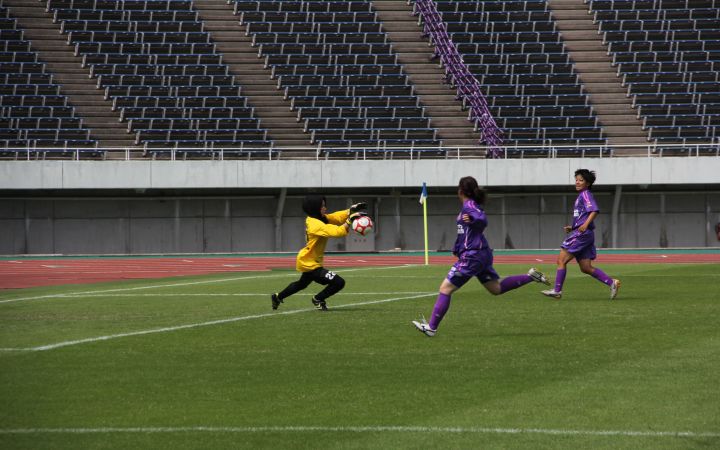- Dr. Hajar Abulfazl, UNITAR alum and former co-captain of the Afghanistan women’s national football team, is passionate about breaking gender stereotypes and creating opportunities for women and girls of Afghanistan.
- Hazar shared her advocacy work in women’s empowerment through sports in an online seminar organized by Ange Violet Hiroshima, Hiroshima City University, UNITAR Association, and UNITAR Hiroshima Office.
- She recalls her learning experiences during the UNITAR Leadership and Communication Training Programme.
- Hajar continues her mission to advocate for women's empowerment and sports.
27 February 2023, Hiroshima, Japan – Once, a 13-year-old Afghan girl was told that boys have more value than girls. That girl grew up to become co-captain of Afghanistan’s first women’s national football team, a medical doctor and an advocate for Afghan women and girls.
Dr. Hajar Abulfazl became interested in football when she was 13. In playing football, Hajar found independence, strength and confidence to pursue her dreams. Hajar welcomed the opportunities and challenges of being a national athlete and embraced the responsibilities of being a role model. She thinks having seven sisters also fuelled her passion to break stereotypes and create opportunities for women and girls.
Hajar made it her mission to reintroduce football into a society that valued boys over a girl. Through the national team’s achievements and the media exposure they received, Hajar gradually saw progress in how women in sports – what once was considered taboo – were gradually accepted among her family members and in her country.
Championing Youth and Women’s Empowerment
Hajar continues her advocacy work as she turned from a player into a coach. Currently living in Hawaii, Hajar is focused on her studies in public health and coaching youth players in a local sports academy. Hajar says she wants to coach the young players in developing more than technical football skills.
Besides training them on how to improve their soccer skills, I want them to improve their life skills. To be a good person, be polite, and have a good attitude. Have a good goal for yourself and open your mind to the future.
In 2015, she founded Tawana Organization, a non-profit organization whose mission is to develop grass-roots football in Afghanistan and break the taboo of women and girls in sports. She worked with the national football federation and visited schools in Afghanistan and spoke in every class to introduce the sport, its benefits and its activities.
Since the 2021 regime change in Afghanistan, Tawana Organization is helping Afghan athletes find new homes and safe and free spaces to practice and pursue their sports careers.
Holistic Training in Japan
In 2018, UNITAR invited the Afghanistan women’s national football team to the UNITAR Leadership and Communication Training Programme in Hiroshima. During the week-long programme, the whole delegation of athletes and coaches learned about gender empowerment and built their skills and knowledge on leadership, team development, communication and sports psychology.
Hajar considers the friendly game and engagement with Ange Violet as a highlight of the trip. It gave the Afghanistan team a chance to examine the training and coaching methods of a team that Hajar considers a world champion.
I was thinking that I am going to have a friendly match in the same field with a champion of the world. But looking at their mindset – they are not thinking just of themselves. They are thinking for generations, about what we can do for the next generation.
Hajar attributes Japan’s mindset and grass-roots approach to sports to having a 50-year plan. She learned that having both short-term and long-term plans was crucial, not only thinking for themselves but for future generations.
Hajar says she also learned a lot from the people and history of Hiroshima. The study tour at the Hiroshima Peace Memorial Park ignited Hajar’s hope for her country. She learned how the Japanese people did not give up and came together after that war in 1945.
I think every country has war. We had a war. But what Hiroshima made afterwards is a big message for everybody, for us too.
Leadership Training On and Off the Field
In 2022, Hajar joined as a panellist in an online seminar “Sports Development for Development and Peace: Peacebuilding and Women Empowerment through Sports in Hiroshima”, organized by Ange Violet Hiroshima, Hiroshima City University, UNITAR Association, and UNITAR Hiroshima Office, where she reflected on her journey with UNITAR and the valuable lessons she gained. She shared how she applied those lessons to her life and work after the training programme. She also spoke about the role of sports in achieving peace.
Actively playing from 2007 until 2017, Hajar attests to the power of sports as a universal language that can unify societies. She aims to impart what lies beyond the corners of a football field: character formation and social awareness. Whether as a player or a coach, she wants to help young people build powerful life skills.
Through coaching, I encourage them to be good people, have self-confidence and find what they want to do in this life – not just play without mission.
Life Mission
After finishing her medical degree in 2017, Hajar moved to Washington, D.C. to work for a non-profit organization on health, which sparked her interest in public and global health. Hajar is now committed to running her non-profit organization and completing her studies in public health and education.
She has made it her life mission to give back and hopes one day to join the Afghanistan Ministry of Health so she can make and implement policies and use sports to promote health in her country.
Football was a big influence on Hajar’s life. It shaped and led her to the woman she is today.
This is not just about football. We can learn and we can talk and we can teach the girls: You will fail, you will go down. But you can come back bigger, and you can be a big message of peace in this world.
About UNITAR
The United Nations Institute for Training and Research (UNITAR) is a dedicated training arm of the United Nations. In 2021, UNITAR trained 370,139 learners around the world to support their actions for a better future. In addition to our headquarters in Geneva, we have offices in Hiroshima, New York, Bonn and various networks around the world.
One of the eight divisions of UNITAR, the Division for Prosperity, based in the Hiroshima Office and Geneva Headquarters, seeks to shape an inclusive, sustainable and prosperous world. World-class learning and knowledge-sharing services on entrepreneurship, leadership, finance and trade, digital technologies, and nuclear disarmament and non-proliferation are offered. We empower individuals from developing countries – especially women and young people – to address inequalities. Our alumni are making a difference in least-developed countries, countries emerging from conflict, and small-island developing states.



